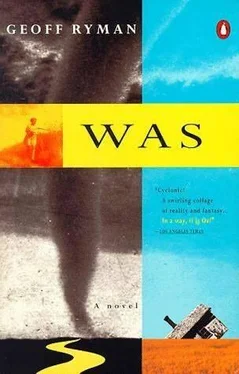"Isn't she a little heroine, though?" said Aunty Em. "All the way from St. Louis by herself."
"I'd say it was an epic journey," said Etta, giving Dorothy a little shake, and spoke to her alone. "And it's not over yet. You've still got to get to Zeandale."
"Oh, you know Henry and I regard ourselves as Manhattanites!" Aunty Em corrected her with a chuckle.
Uncle Henry came backward through the door, pulling the trunk. Toto began to bark again and harassed Henry's heels.
"Gone'n brought her dog," muttered Henry.
"I can see that, Henry," said Aunty Em, voice low, her eyes avoiding Etta. Her hair was raked back tightly into a bun, and her hands pulled at it. There was a row of curls across her forehead.
"Zeandale's nice too," murmured Etta. Toto whimpered, circling Dorothy's heels. Everything was confusion.
"Can… can we give you a lift up the hill, Etta?"
"Very kind of you, Mrs. Gulch, but I have my uncle's pony and trap."
"You mustn't overtax your strength, dear."
"I won't," promised Etta.
"Well, then," sighed Aunty Em, as if everything had been delightful. Her smile returned as gray as a cloudy day. "We must be on our way. Do remind me to your dear Aunt Ellen. And may I drop into Goodnow House next time I'm in town? I would so love to see you all."
"Of course," said Etta.
"And thank you so much. Say thank you, Dorothy."
"Thank you, Etta."
"Thank you, Miss Parkerson ," Aunty Em corrected her.
"Thank you , Dorothy," said Etta quickly. Then she kissed Dorothy on the forehead again. Dorothy could feel it, as if it glowed. For a moment she felt as though nothing could hurt her.
Dorothy sat on the trunk in the back. She looked backward as the station, the town, disappeared in trees.
"Well I must say, Dorothy," said Aunty Em. "You do make your acquaintances from the top social drawer!"
The wagon wheels thrilled over the surface of a stone bridge across the river and into shade. Overhead there was a high bank of clouds.
"Believe it's going to rain at last," said Uncle Henry.
"Hallelujah," said Aunty Em, her eyes fixed on the clouds. Then she turned and tapped Dorothy on the knee. "Out of the wagon while we go up the hill, Dorothy. Spare poor old Calliope."
Dorothy didn't understand.
"Calliope is our mule, Dorothy, and it's not fair to make her haul us up hills. So we'll have a nice walk."
The road had been baked into ruts. Aunty Em took her hand, and they walked in twilight into trees. "You should have been here in spring," said Aunty Em, "and seen the sweet William." Her face went faraway.
"I can remember going up this road for the first time myself," she said. "I was sixteen and your mama was nine, and we walked through here. It was just a track then. We walked all the way to Papa's plot of land. Through these beautiful trees. And then we saw the valley, like you will soon, all grass and river, and we camped there. And we slept under the stars by a fire, looking up at the stars. Did your mama ever talk to you about that, Dorothy?"
"No," said Dorothy. "No, Ma'am." Her mother had never spoken about Manhattan.
"Did she talk about your Grandfather Matthew? How he came here and built a house?"
Dorothy thought she better answer yes.
"Your grandfather came out here just like Etta's uncles, for the same reason. To keep Kansas a free state. And he worked on Manhattan's first newspaper, and then for the Independent with Mr. Josiah Pillsbury. We are educated people, Dorothy. We are not just farmers."
None of it made sense. Everything was so strange. It was like a dream. Dorothy knew that she would never wake up from it.
"There," said Aunty Em, at the top of the hill.
More shadows, more trees, fields.
"Isn't it pretty? Prime river-bottom land. They talk about pioneer hardships. Well, we must have been lucky. What we had, Dorothy, was pioneer beauty."
What Dorothy saw on the other side of the hill was flat, open land. There would be no secret places in Zeandale like there had been in St. Louis, no nooks and crannies, no sheltering alleyways. Even the trees were small, in planted rows, except on some of the farther hills, and they looked dim and gray. White, spare houses stretched away at regular intervals between harvested fields. Dorothy could see a woman hanging up sheets. She could see children chasing each other around a barn. The soil that was gray on top was black where broken open.
"We'll get you back home and give you a nice, hot bath, first thing," said Aunty Em. She was still thinking about the Dip.
It took another hour to get to Zeandale. They turned right at a school-house and went down a hard, narrow lane. The wagon pitched from side to side. Its old gray timber threatened slivers. Dorothy pushed with her feet to stay seated on the trunk as it was bumped and jostled.
Ahead there was a hill, mostly bald, with a few patches of scrub. To the right of that, more wooded hills folded themselves down into the valley. The lane bore them around to the right toward the hills. The sky was slate gray now; everything was dim. As the wagon turned, Dorothy saw something move beside the lane. Had it stood up? Its sleeves flapped. As it walked toward them, Dorothy saw it was a boy. He was whipping his wrist with a long dry blade of grass. As he neared the wagon, he doffed a floppy, shapeless hat.
"Good evening, Mrs. Gulch, Mr. Gulch."
"Good evening, Wilbur," said Aunty Em.
"Mother saw you leaving this afternoon, so I thought I'd just set by the road till you came back along so I could hear the news."
"I brought the news with me," said Aunty Em. "Wilbur, this is my little niece, Dorothy, come all the way from St. Louis to live with us. Isn't she the prettiest little thing?"
"Sure is," said Wilbur. He had a long, slightly misshapen face, like someone had hit him, and he had a front tooth missing.
"This is Wilbur F. Jewell, Dorothy, one of our neighbor's boys."
"Hello," said Dorothy. Across the fields, there was a white house, with two windows, and an extension. "Is that your house?"
"Yes indeed."
"It's lopsided," said Dorothy.
"Dorothy, this is Kansas, and in Kansas we take account of manners. The Jewells came here like your Grandfather Matthew and built that house themselves."
"We should have built a new one by now," said Wilbur quietly.
There was more chat. Some long-term trouble was spoken of: banks and payments. The smoke from Wilbur's house was blue and hung in the air like fog.
"Tell your mother I'll be along as soon as I can," said Aunty Em, sounding worried. The neighbors parted. Wilbur walked backward, waving his hat.
"Let's hope the rain don't wash the crops away," called Uncle Henry from the wagon.
"Goodbye, Will!" called Dorothy. She liked the way he was put together, like a bundle of sticks.
Aunty Em sat straight and still for a while, and then seemed to blow out as though she had been holding her breath. "Well!" she exclaimed. "Boy his age with nothing better to do than sit all day by the road like a scarecrow on a Sunday! What is his father thinking of?"
"I reckon old Bob Jewell's giving up," said Uncle Henry. His voice went lower and quieter. "The land can break a man, Em."
"Depends on the man," sniffed Aunty Em. She was pulling her hair again.
Home came slowly toward them. Home was small and gray, a tiny box of even, unpainted planks of wood, with a large stone chimney and no porch, just steps. It nestled between two hills that reached from opposite directions into the valley. Dark twisted woodland reared up behind it. The barn sagged. Dorothy took account of manners and was silent. Toto began to bark over and over.
Aunty Em covered her ears. "Dorothy, try to still your dog, could you?"
"Ssh, Toto," said Dorothy. Deep in his throat, teeth slightly bared, Toto kept growling.
Читать дальше












